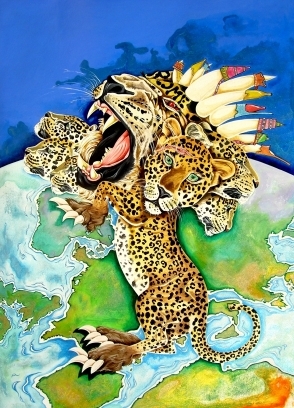Thirteen Strikes of the Clock. With a man burned alive by a furious crowd in Cameroon after amputating his lover’s breasts and genitalia, and a young man going on a gun rampage in Connecticut, America, is December 2012 a bad omen for 2013 – and has the Mayan calendar’s prophecy of apocalypse for the now passed date of 21st December 2012 a subtler but no less deadly meaning for the longer term?
30 December 2012
7,913 views
No Comment
From a cold blooded murder in Bilongue, Douala, Cameroon, to the Connecticut gun rampage in Newton, United States, geographical distance has not prevented a seeming synchronicity of horrors rocking the world towards the close of 2012, which to some minds does not bode well for 2013.
It is believed that the missing genital parts and breasts of Cameroonian 20 year old Fanny’s body would have been used in witchcraft and sorcery for the pursuit of fame and success, if her butcher, D. Pablo, had managed to escape the crowd’s fury.
Within the same frame of time, the Connecticut elementary school carnage perpetrated by 20 year old Adam Lanza, killing 20 children and six adults including his mother and himself, has been associated with mental illness (psychopathic personality disorder). Both events were beyond ordinary human comprehension.
The recent litany of tragedies involving black magic, sorcery, sects, human and organs trafficking, wars, and natural disasters such as earthquake and floods disturbingly tallying with the omens of the Mayan calendar, which also predicts 2013 will see either the end of the world, or the dawn of a new dark era in which Satan – the leader of the fallen angels and adversary to God – will rule the world.
According to an interpretation of the Gospels by Bible Studies site acts17-11.com, specifically, a clause entitled ‘The Olivette Discourse: Interwoven from Matthew, Mark, and Luke Mat 24:3-9 (NIV)’:
‘As Jesus was sitting on the Mount of Olives, the disciples came to him privately. “Tell us”, they said, “when this will happen, and what will be the sign of your coming and of the end of the age?” Jesus answered: “Watch out that no one deceives you. For many will come in my name, claiming, ‘I am the Christ,’ and will deceive many. Such things must happen, but the end is still to come. Nation will rise against nation, and kingdom against kingdom. There will be famines and earthquakes in various places. All these are the beginning of birth pains.’
Speculations on the likely date and nature of apocalypse have been percolating for centuries. In her article entitled ‘What Catholics Believe about the End of the World’, Kenneth E. Untener writes:
‘In January 1843, a preacher named William Miller — the founder of the American Adventist movement — announced that the end of the world would take place between March 21, 1843, and March 21, 1844. He had combed the Bible for clues and figured it all out in speculating about a final battle of Armageddon between the forces of good and evil preceding the end of the world.’
Jesus used to talk in parables. According to the Online Encyclopaedia, a parable is any figurative narrative passage – such as those told by Jesus – that conveys a religious message; a succinct story, in prose or verse, which features in general human characters who illustrate one or more instructive principles, lessons, or ethics.
But why has the Mayan calendar predicted apocalypse for the final month of 2012, just before 2013?…
Follow the links below to read more:
Rachel Tcheungna, Author, Writer of
The Bridge Books and
The Bridge Magazine Editor.
In numerology, the number 13 is often associated with bad luck, darkness or misfortune.
The Online Encyclopaedia defines numerology as the branch of knowledge that deals with occult study and the significance of numbers and their supposed influence on human life.
For the cabalists, those skilled in esoteric doctrine or mysterious arts, the number 13 symbolises the snake, the dragon, the murderer, and Satan.
Is the macabre December 2012 a sign of future disaster? Is 2013 to mark the beginning of an era dominated by evil?
The reasons why the number 13 has maintained such an insidious reputation throughout history can be traced back to religious roots.
In Christianity, the number 13 brings misfortune and is associated with Judas
Iscariot, the twelfth disciple, and the ‘thirteenth’ guest at the Last Supper, during which Christ revealed that one among them would betray him. The New Testament tells that afterwards it was Judas who turned Jesus over to the Romans, which led inexorably to his crucifixion.
Also, the thirteenth chapter of the final book of the Bible, Revelation, is reserved the coming of ‘the Beast’ and its rising out from the sea. Most consider this Beast to be the Antichrist, who will spread evil throughout the world.
The number 13 is also believed to be the age that ‘adepts’ usually start to learn witchcraft.
In the 13th Psalm, it is written: “The fool has said in his heart, there is no God”.
If we take into account the gruesome magnitude of the events during December 2012, and the connotation of an evil force that controls the world through certain individuals, the more religious among us may well begin to see an emerging pattern becoming more and more marked towards the advent of 2013.
This is the reason why, Friday 21st December 2012 would have been understood and apprehended more as a ‘wake up call’, a spiritual upheaval, possibly signifying some divine will’s effort to reveal to us not a course towards the end of the physical world in which we live, but the emergence of an unprecedented epoch of malevolent teleology – that is, of the risk of darker destinations in the design and purpose of nature, or Creation.
Indeed, it could well be that the end of the Mayan calendar has a spiritual rather than physical meaning.
It could signify that if, as of Friday 21st December 2012, humankind does not renew and prioritise its sense of moral ethics before all other material considerations, evil will gain the upper hand over our collective destiny.
That unless a replenished consciousness and application of ethic is promulgated to guide humanity’s spiritual growth, 2013 is likely to become the landmark year of an era where people will transmute their virtues into vices for decade to come. People will either navigate their way through, or ruinously embrace temptations of fame, prestige and wealth.
There could be less sense of shame, less honest debate, less moral scrupulousness, and more moral lapses and crimes, possibly even more prolific than the Grand Guignol of greed, debauchery, mass murder, bloodshed for oil and rape of mineral resources, mass rapes of women in lawless war-torn nations, human and organ trafficking, prostitution, and mass abuse and murder of children, that has characterised the past few years.
But is this all reason enough for humankind to lose complete hope in the future and sink into despair?
We certainly seem to live in a world of evil. However, we should recognise that there is still some good in the world as well, and Manichaeism can help us to apprehend, adapt and cope with the reality of the world in which we live.
Manichaeism is an ancient eschatological (of ‘last teachings’) doctrine that takes the issue of universal evil seriously. In a similar way as to how Christian theologians such as St. Augustine, Martin Luther and John Calvin proselytised the concept of ‘original sin’, our essential ‘fallen-ness’, as a core spiritual pathology which humankind had to overcome in this world in order to secure salvation in the next, Manichaeism put primary – and in some ways more physical – emphasis on our ‘fallen’ state by teaching that it is not only the subjects of Creation who are blighted by an inherent vein of evil, but Creation itself.
Manichaeism believed that the world had not been created by God through his benevolence, but through malign imitations by malevolent ‘spirits’ called demiurges – and that, thus, Creation was inherently evil, though designed to deceive us into perceiving it otherwise.
A sense of ‘Manichean dualism’ which infused orthodox Christianity from St. Augustine onwards has arguably made humankind more aware of the reality of evil as something that confronts good; and in the minds of many religious people, such metaphysical knowledge serves as a vital guide towards cultivating a good and true life and sense of well being in spite of the ubiquity of evil.
We all know that, unlike in fairy tales, the world in which we live is a real, and, therefore, imperfect one, through which the eternal war the forces of light and darkness is waged; a world where beauty has to challenge the beast, the truth, the lie, and good, evil.
And as long as humankind is aware of this fundamental dynamic to existence, and of the constant contrast of light and dark, there is always reason to hope, and to fight and defeat ‘the Beast’, for a better world.
In his article entitled ‘On Powerless Freedom: About Good and Evil’, Professor Francesco Botturi, a teacher of moral philosophy at the Università Cattolica in Milan, writes:
‘Manichaeism makes human freedom relative; it does not make it the active locus of the clash between good and evil. The struggle takes place elsewhere. The unbearable nature of evil; the fact that it is scandalous, and if there does not exist a reason and energy capable of overcoming it, the spontaneous temptation is to expunge it from oneself.’
St. Augustine (354-430) was a fourth century philosopher whose ground-breaking philosophy infused orthodox Christian doctrine.
His approach to the issue of evil and redemption is believed to have been the most intellectually and emotionally satisfying for the majority of Christians since. For much of his life Augustine worked hard at trying to find a salvific solution for humankind in an attempt to give it hope and offer meaning to people trying to make sense out of life in a fallen world.
According to Augustine, one does not need some special theological acumen to look around the world and realise something is desperately wrong. The existence of evil is one of the most vexing challenges a Christian – or any person –must grapple with. To this, Augustine wrote:
‘Evil has no positive nature; but the loss of good has received the name ‘evil’: evil always injures, and such injury is a deprivation of good. If there were no deprivation, there would be no injury. Since all things were made with goodness, evil must be the privation of goodness: All which is corrupted is deprived of good.
The diminution of goodness is what’s called evil. Good has substantial being; evil does not. It is like a moral hole, a nothingness that results when goodness is removed. Just as a shadow is no more than a “hole” in light, evil is a hole in goodness.’
On the other hand, 13 is not always a bad number. In Catholicism, for example, we often find the number 13 associated with the Virgin Mary, she whose mission it was to ‘crush the head of Satan’. The Feast of her Assumption (passage into Heaven) has occurred on a number of Friday 13ths.
The numerologist ‘Joanne’ at sacredscribes.net holds a more balanced and Cartesian approach as to the interpretation of the number 13:
In October 2012, in her article entitled ‘Repeating Number Sequences and their Messages and Meanings’, she wrote:
‘The number 13 has great power. If this power is used for selfish purposes, it will bring destruction of the self, and in turn, this will bring disease and illnesses. Adapting to change gracefully will bring out the strength of the 13 vibration, and decrease any potential for the negative.’

‘The Beast’ and I stood upon the sand of the sea,and I saw the beast rise up out of the sea.
The Bridge MAG image.
At this time, therefore, we should bear in mind that human nature is not perfect and neither is the world in which it exists. In the view of the religious, everything now depends on how each of us as individuals intend to embrace the future; on how much application of moral ethics each of us will put into whatever we do from 2013 onward, in order to defeat evil for the prosperity of humankind.
It is great to be aware, not scared, of the moral hazards ahead, and we should remain optimistic, positive, and keep our ethics replenished.
Whatever happens, we should aim above all for a sense of well being and peace, for ourselves and others, and for those who more perilously pursue the material ‘salvations’ of wealth, prestige and fame, they must navigate their paths carefully, always ensuring that nothing they achieve is ever at a human cost.



